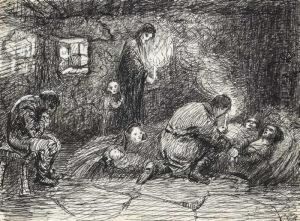Constance Markievicz Paintings
Constance Markievicz, born Constance Georgine Gore-Booth on February 4, 1868, in London, England, was a prominent Irish revolutionary, politician, and suffragist, remembered not only for her significant contributions to the arts but also for her crucial role in the fight for Irish independence. The eldest daughter of Sir Henry Gore-Booth, an Arctic explorer and philanthropist, and Lady Georgina Gore-Booth, Constance grew up in the privileged surroundings of Lissadell House in County Sligo, Ireland. Despite her aristocratic upbringing, she was deeply moved by the plight of the Irish peasantry, which influenced the trajectory of her life's work. An accomplished painter and landscape artist, Markievicz studied art in London and later in Paris, where she met her future husband, Count Casimir Markievicz, a Polish nobleman.
Her marriage brought her into the circles of European avant-garde artists and intellectuals, but Constance's heart remained with Ireland and its cause. Her political awakening was catalyzed further by her return to Ireland, where she immersed herself in nationalist politics and the suffragette movement. A dedicated socialist, Markievicz was actively involved in the labor movement, co-founding the Irish Citizen Army with James Connolly to defend workers' demonstrations from police brutality. Her commitment to Irish independence led her to play a significant role in the Easter Rising of 1916, where she served as an officer in the Irish Citizen Army, one of the few women to hold such a position. For her participation in the uprising, she was sentenced to death, a sentence later commuted to life imprisonment due to her gender. She was released under a general amnesty in 1917.
Markievicz's political career did not end with her imprisonment. In 1918, she became the first woman elected to the British House of Commons as a member of Sinn Féin, although she, along with the other Sinn Féin members, abstained from taking her seat, instead participating in the formation of the Dáil Éireann (the Irish Parliament). She served as Minister for Labour from 1919 to 1922, becoming the first female cabinet minister in Europe. Constance Markievicz's life was marked by her unwavering commitment to Ireland's independence and social justice. Despite declining health, she continued to work tirelessly for the causes she believed in until her death on July 15, 1927, in Dublin, Ireland. Markievicz is remembered as a pioneering figure in Irish history, a woman who broke barriers in both politics and society, leaving a legacy that continues to inspire.




